We teach our dogs to come. Even the little ones will rush towards you with a bit of training. (Scooter has a hard time putting on the brakes. He stopped just behind me.)
Like dogs, horses can be taught to come for treats. However, a horse is a grazer, and a dog is a predator, and they respond very differently to food offered up as rewards.
Dogs love the chase. Part of the enjoyment of training for them is the game involved – the excitement of watching the tossing of the food, the coursing after a fast moving treat, the hunting for the bit of kibble on the ground. Horses are the opposite. They don’t want to speed towards their dinner. They get pleasure and comfort from calmly shuffling along as they graze.
Part of the horse’s different response to food in training is due to how they literally see their world. Always keep in mind that a horse’s sight is very different than ours and our dogs. Horses have poor vision close up. If they see it at all, the cookie that you offer your horse is a blur to them. Also, we are all taught to feed our horses facing forward, with our outstretched hand in front of them. That’s right where horses have a blind spot! They need their whiskers to find and identify what’s in your hand, or dropped on the ground. (Never shave your horse’s muzzle! More about that here.)
This all doesn’t mean that you can’t train a horse to come to you with speed and enthusiasm. (I’ve written about that here.) But, understanding the nature of your horse, and their perception of the world, and what’s valuable to them, will enable you to train better, and be a lot more patient and understanding when they don’t respond with the equivalent of tail-wagging enthusiasm of your dog.
There’s more to consider: when training any animal, context matters.
Here is Tonka, doing what most people would say is the ideal recall – I said come and this was his response.
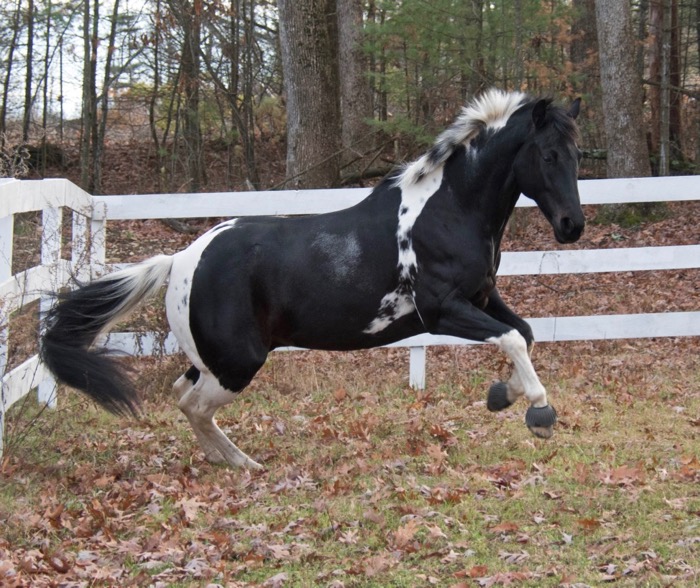
His reward was one peppermint.
But that doesn’t always work.
In that example, it was a windy and cold day. There was something in the woods that had him on alert. It was nearing 3 o’clock when the horses got brought into the barn. When I called and crinkled the peppermint wrapper, Tonka was already in the aroused mental state to respond like that.
Here’s another time when Tonka came, with speed, when called.

But, again, there were deer moving in the woods, pumping up his adrenaline. Also, this paddock was dirt. The horse that he shared it with wasn’t a friend and hogged the hay nets. Tonka knew that when I called him, he’d get to graze on the lovely green grass right on the other side of his fence. Of course he’d come running.
Here was my horse yesterday.
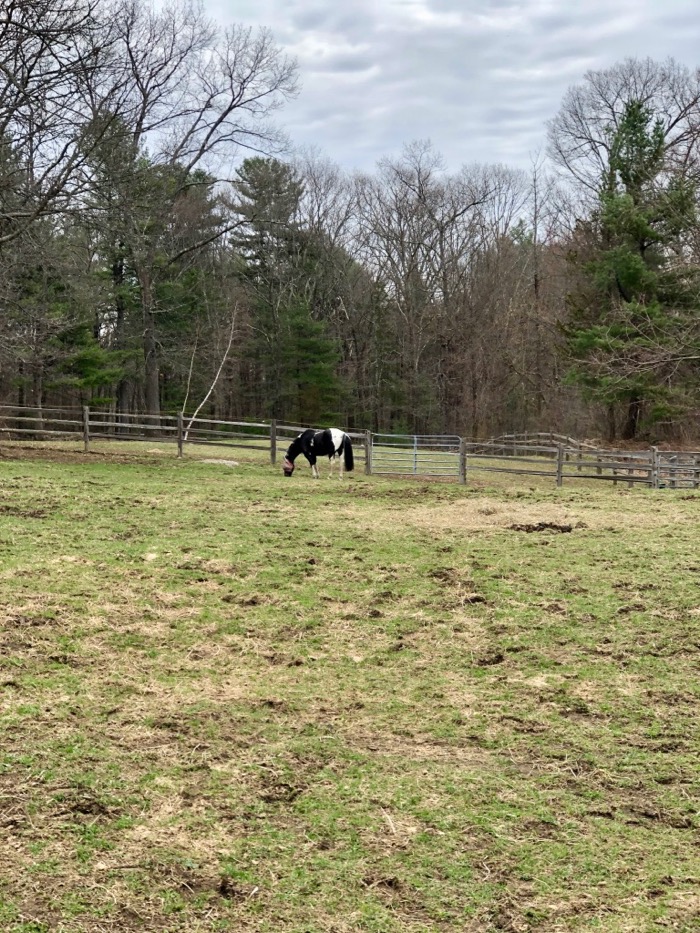
The grass is coming in. It’s a warm day. Tonka is shedding and he’s in a lazy mood. His best friend is in the paddock next door. I call. He glances at me and goes back to grazing.
I expected this, so I’m not frustrated and I’m not feeling put out. It’s asking too much for him to leave the most valuable things that a horse has – forage, friends, and open space to meander in.
I walked closer and called again. Often, if you reduce the space between you and your animal, that changes the equation enough to that they’ll willingly respond. This worked for Tonka. He decided to come. Albeit slowly.
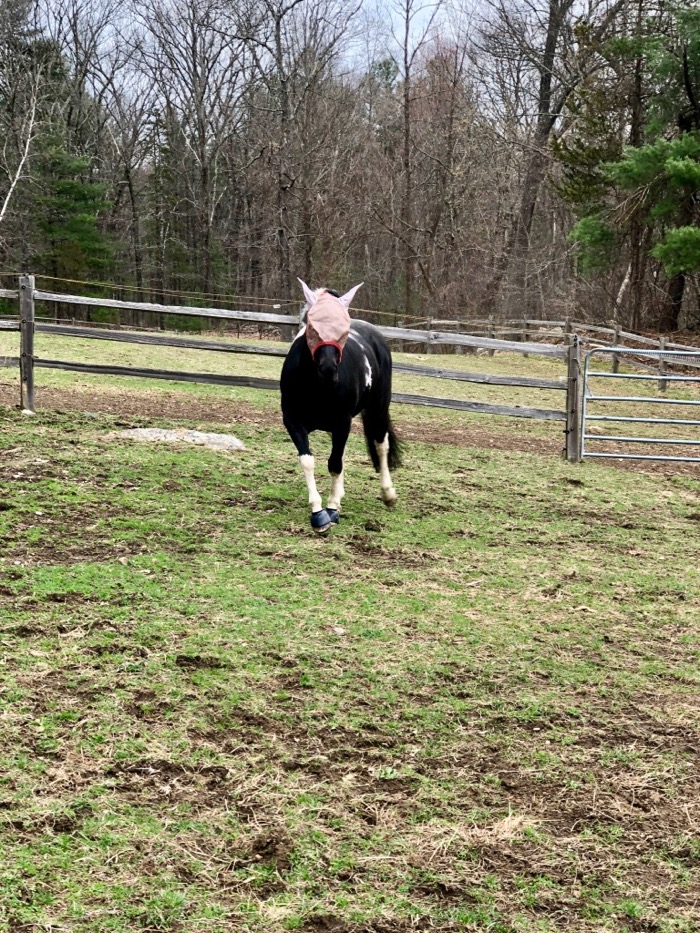
That was okay. I was pleased that Tonka valued me (and the cookie) that much. Before bringing him up to the barn, I let him graze on the lush grass on the verge. That way, he’d associate coming with something similar to, but better, than what he was so enjoying in his paddock. Just five minutes of this can make all the difference in how your horse views being brought in.
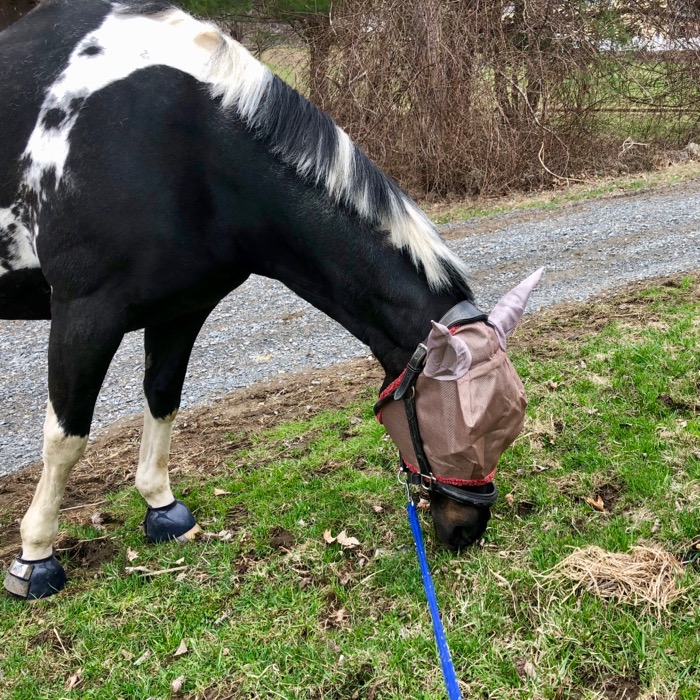
After a good ride of both schooling in the ring and a walk through the woods, I put him back in his paddock.
Tonka didn’t leave to go graze right away.
Do we have anything else to do together? he asked.
Which made me feel as accomplished a trainer as if he’d done a speedy recall.
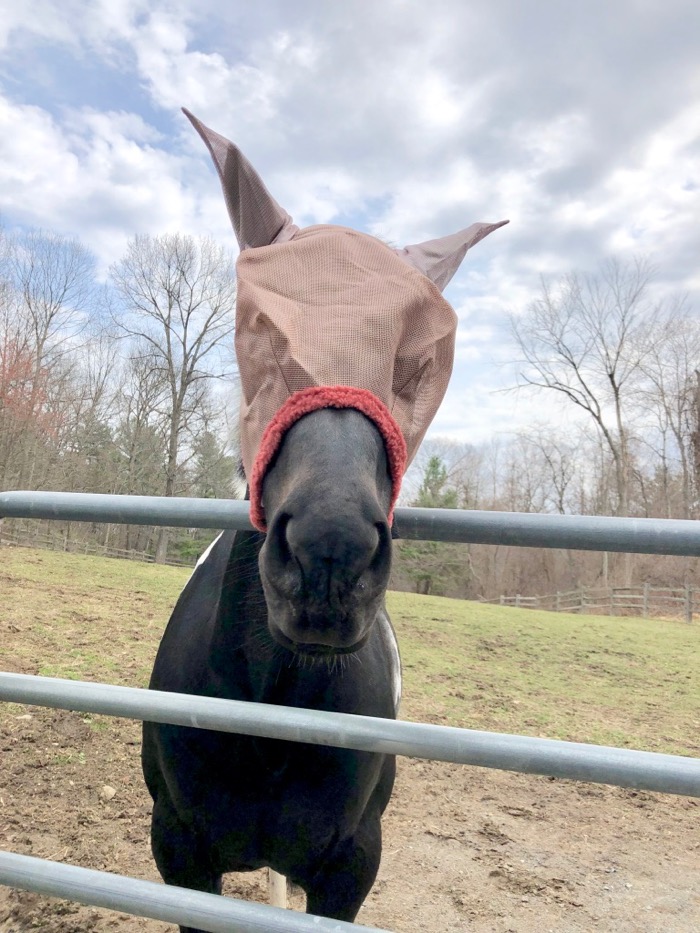
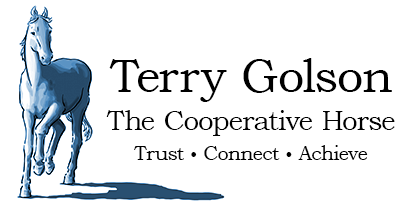

Delightful commentary – Every morning I check your blog for updates. When you post a new one, I grab my coffee and settle for a moment outside my daily routine. thank you!
Kathryn
THANK YOU for this comment. Your response to my blogs is exactly what I hope for.
I loved the photos of Tonka coming when called.
And NOT coming when called during a very relaxed time in his paddock where the new grass is starting to grow–makes sense to me. And taking him outside for even better new grass is a nice thankyou.
KP
Our conversations have helped me to think this sort of situation through. As we discussed last week, you’ve always seen training as a conduit to conversation, and as a way to better understand the animals. With that perspective, my interactions with my animals is less fraught with conflict.